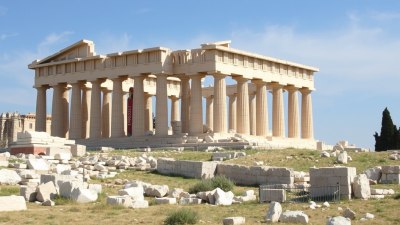The Acropolis in Greece Doesn’t Want to Be Reconstructed, Just Understood
Explore the significance of the Acropolis as a symbol of ancient Greece and its preservation rather than reconstruction.

Image created with Flux Schnell
The Acropolis of Athens, a marvel of ancient architecture, stands as a testament to the ingenuity of the ancient Greeks. It is not merely a grand structure but a symbol of cultural identity and historical continuity.
In recent years, conversations surrounding the preservation of the Acropolis have gained momentum. Many people are calling for a reconstruction of various sections of the site, arguing that its grandeur has been diminished over the centuries. However, archaeologists, historians, and preservationists alike contend that the Acropolis should not be reconstructed. Instead, it ought to be understood in its current state, representing both its glorious past and the passage of time.
The Historical Context of the Acropolis
The Acropolis, chiefly known for the Parthenon, was not only a religious center but also a symbol of the democratic ideals of ancient Athens. Constructed during the Golden Age of Athens in the 5th century BC, it reflects the artistic and architectural advancements of that era. The site has witnessed significant historical events, from its role during the Athenian Empire to its subsequent transformations under Roman, Byzantine, and Ottoman rules.
Throughout its history, the Acropolis has undergone various alterations and restorations, each responding to the cultural and ideological shifts of the times. These changes speak to the ways societies remember and interpret their pasts. Therefore, the Acropolis today is a palimpsest of history, and to reconstruct it would mean to erase these complex narratives.
The Case for Preservation Over Reconstruction
Preservation advocates emphasize the importance of allowing the Acropolis to remain in its current state—to appreciate the value of time and decay. This perspective highlights that every crack and weathered stone tells a story, contributing to our understanding of history. The patina of age contributes to the Acropolis’ authenticity and charm. By choosing to preserve rather than reconstruct, we maintain a link to history that invites contemplation and respect for the passage of time.
Moreover, the push for reconstruction can stem from misconceptions about heritage conservation. Some may view the deterioration of extensive sites as a failure to preserve culture, overlooking that preserving ruins in their current form allows for a more nuanced interpretation of history. It allows today's visitors to engage with the site in a more meaningful way, encouraging them to question what they see and learn from it.
Cultural and Educational Value
The Acropolis serves as an important educational resource, providing insights into ancient Greek civilization. The more we understand about its construction, its purpose, and the myriad influences it has endured, the greater appreciation we have for its significance. Educational programs and platforms that facilitate research into the Acropolis promote a deeper understanding, showcasing its role in not just ancient Greece, but in the evolution of Western civilization as a whole.
To merely reconstruct portions of the Acropolis would risk overshadowing its educational potential. Visitors often come to absorb the history and cultural significance emanating from its ruins. On-site exhibitions and interpretative materials can guide visitors through the narratives encoded in the structure, nurturing a space for reflection and learning.
The Role of Technology in Preservation
Modern technology plays a crucial role in both the preservation and understanding of the Acropolis. Advanced techniques such as laser scanning and photogrammetry allow archaeologists and conservationists to document and analyze the site in detail. These methods enable a clearer understanding of the changes that the Acropolis has undergone over millennia, informing preservation strategies without the need for reconstruction.
By leveraging technology, we can safeguard the site for future generations while fostering engagement through virtual experiences that simulate historical contexts without altering the physical structure. Such innovations can enhance accessibility, allowing individuals worldwide to appreciate this iconic site remotely. This democratization of knowledge can cultivate a global understanding of the Acropolis and its significance.
The Importance of Visitor Engagement
Engaging with the Acropolis does not simply happen through physical presence; it also occurs through intellectual and emotional connections. Visitors to the site often reflect on its beauty, history, and the metaphysical questions it raises about longevity and the nature of civilization. This is why it is pivotal to maintain the site as it stands today, with its imperfections and historical scars intact. The emotional experience of witnessing the Acropolis in its original condition encourages dialog and critical thinking about the past.
Curriculum development encompassing the Acropolis in educational systems can enhance this engagement further. By incorporating the site into various subjects—from history to philosophy - students can better appreciate its relevance beyond mere architecture. Discussions on ethics, history, and culture relating to the Acropolis can inspire new generations to preserve not only this site but also other markers of cultural significance worldwide.
The Global Perspective on Heritage Conservation
Countries around the world grapple with the challenge of preserving historic sites that face similar pressures as the Acropolis. Each site tells unique stories, shaped by the cultures and histories they represent. The push for reconstruction must be evaluated within a broader context that considers an understanding of what preservation entails globally.
International collaborations are paramount, allowing nations to exchange ideas and strategies for confronting preservation challenges. The Acropolis serves as a model for such initiatives, symbolizing the universal desire to connect with the past without losing or distorting its meaning. Participation in forums and conferences dedicated to cultural heritage can foster dialogue on such vital issues.
Conclusion: Embracing the Philosophy of Understanding
The Acropolis of Athens stands not only as a physical structure but as a philosophical emblem of resilience, continuity, and the human spirit's desire to understand its past. As we navigate discussions on the future of such historical sites, embracing a philosophy of understanding over reconstruction emerges as fundamental to their preservation.
Each visitor, researcher, and policymaker plays a vital role in this journey of interpretation. The stories embedded within the Acropolis remind us that our shared history is multifaceted, susceptible to reinterpretation and change while remaining a constant presence in our cultural landscape. It is crucial to recognize the value that exists within the ruins, celebrating them not as remnants of a lost past but as vibrant pillars of history that continue to educate, inspire, and provoke thought.











